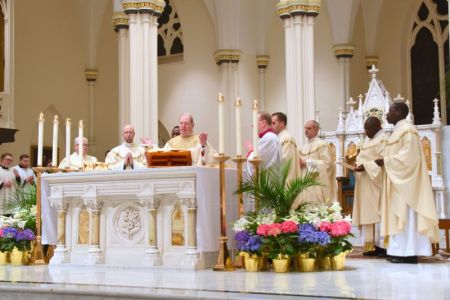Catholic Diocese Leaves Maine Council of Churches to Distance Itself From LGBT Advocacy

The Roman Catholic Diocese of Portland will withdraw its membership from the Maine Council of Churches over concerns about LGBT advocacy after a new rule was implemented making it easier for the council to take public stances on societal and political issues.
The Portland Press-Herald first reported on the diocese decision on Tuesday, which follows a council vote in February to make it so that a majority vote among the council's eight member denominations is all that is needed for the council to take official stands on public policy issues.
Previously, it was an unwritten rule of the council to only take public stands after a unanimous vote by its member denominations.
With the change being enacted, it means that the Catholic diocese was outnumbered on the council when it came to issues pertaining to LGBT rights by left-leaning members of the council, including the United Church of Christ, Unitarian Universalists Association of Congregations, the Evangelical Lutheran Church in America, The Episcopal Diocese of Maine and The New England Conference of the United Methodist Church.
Bishop Robert Deeley informed the council of the diocese's decision in a letter sent to council's churches board. The letter stated that the diocese could not continue with its membership because of the rule change. The diocese will officially leave the council on June 30.
"As the Bishop of the Diocese I find this unfortunate, but I see no alternative," Deeley said, according to the Press-Herald. "Our continuing participation could result in me advocating for two different, and even contradictory, positions."
The council's executive director, Jane Field, told the Press-Herald that during the time the United States Supreme Court was weighing the Obergefell v. Hodges same-sex marriage case in 2015, a decision was made for the council to stay quiet on the issue.
"There were lots of times there wasn't a majority vote, but nobody fussed. When it came to certain areas, in particular issues affecting the LGBTQ community, they would invoke this practice (of staying silent)," Field, an ECLA pastor, said. "The tension there became so difficult."
Field told the Religion News Service that going forward, "[r]emaining silent on issues, especially related to LGBTQ justice and equality, wasn't tenable for all of our other seven denominations."
"It was enough of a discomfort that it needed to be addressed openly," she said. "It wasn't healthy to be silent anymore."
Field explained that the option of letting denominations issue a minority opinion on issues they disagree with was discussed. However, the Catholic diocese withdrew its membership anyway.
The Catholic Church's teachings on homosexuality state that homosexual acts are "intrinsically disordered" and "contrary to the natural law."
"What I advocate for cannot be simply determined by a majority vote," Deeley asserted in his letter. "It is expected that my advocacy is grounded in the teachings of the Church. Any other position would be contrary to my responsibility as the bishop of Portland."
The Diocese of Portland has been a member of the council since 1982. The council first came into existence in 1938 and has a goal to "act as one voice to advocate for the disenfranchised, the downtrodden and the protection of God's creation."
Field said that despite the differences on certain issues, it is still a "sad day" to see the diocese leave the council.
"There's a deep sadness, but at the same time, I feel the council still has a vital role to play in the state," she told the Press-Herald. "I believe we will find ourselves side by side with the diocese on certain issues like hunger and human trafficking."
Deeley assured that despite the withdrawal from the council, the diocese will continue to "serve the needs of the poor, the disadvantaged and the migrants among us."





















